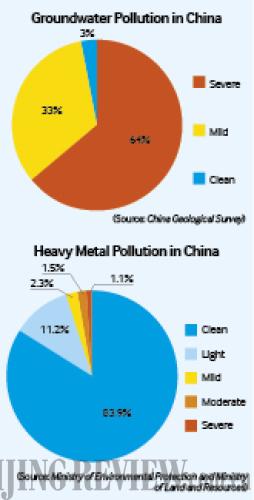|
Land contamination
A survey released in April by China's Ministry of Environmental Protection and Ministry of Land and Resources showed that 16.1 percent of the country's land had been affected by heavy metal contamination. It revealed that the quality of arable land in the wastelands of mining and metallurgical industries is worrisome.
Among all inorganic pollutants, heavy metals, a term referring to metals that weigh over 5 grams per cubic centimeter, present the greatest danger to the health of animals, plants and human beings. If mercury is absorbed by the root system of a plant and then disseminated, its leaves, flowers and stems will typically turn brown or black, its growth will be retarded and more importantly, its fruits will contain mercury.
"In China, land contamination is characterized by the coexistence of new and old pollutants and the mixture of organic and inorganic pollutants," said Zhang Weili, a research fellow with the Chinese Academy of Agricultural Sciences.
Aside from the development of mining and mineral industries, agriculture is another source of pollution, for most Chinese farmers are preoccupied with the effects of chemical fertilizers on grain output.
Zhang Fusuo, a professor at the College of Resources and Environmental Sciences at the Beijing-based China Agricultural University, pointed out that China only accounts for 10 percent of the total arable land in the world, but consumes more than one third of the total chemical fertilizers used. While its grain output grew 150 percent from 1980 to 2008, its consumption of chemical manure also tripled.
Soil pollution affects the quality of surface and underground water, and contaminates agricultural products. However, the treatment of pollution necessitates huge inputs of funds and resources.
At present, most related remediation technologies are still in the experimental stage, and thus far, there has been no case of successful heavy metal pollution treatment in China, said Liu Shuai with the Hunan Provincial Environmental Protection and Resources Conservation Commission.
"China's environmental sustainability has captured the attention of overseas Chinese entrepreneurs who are willing to shepherd funds into related fields such as the research and development of environmentally sound technologies," said Qiao Lihua, an overseas Chinese who migrated to the United States in 1986 and went on to found his own real estate company.
"On the front of heavy metal pollution treatment, China is in its infancy, we can bring about our technologies and share it with Chinese and ASEAN people," said Michael Gianchetta, Vice President of Gianco, an environmental services company in the United States.
Gianchetta said that the United States has accumulated rich experience and developed advanced technologies in the field of heavy metal pollution prevention and control, which have been employed in the effective treatment of mining and metallurgical wastes. "We are expecting more concerted efforts from China as well as ASEAN members in combating heavy metal pollution," he added.
(Reporting from Nanning, Guangxi )
Email us at: dengyaqing@bjreview.com

| 